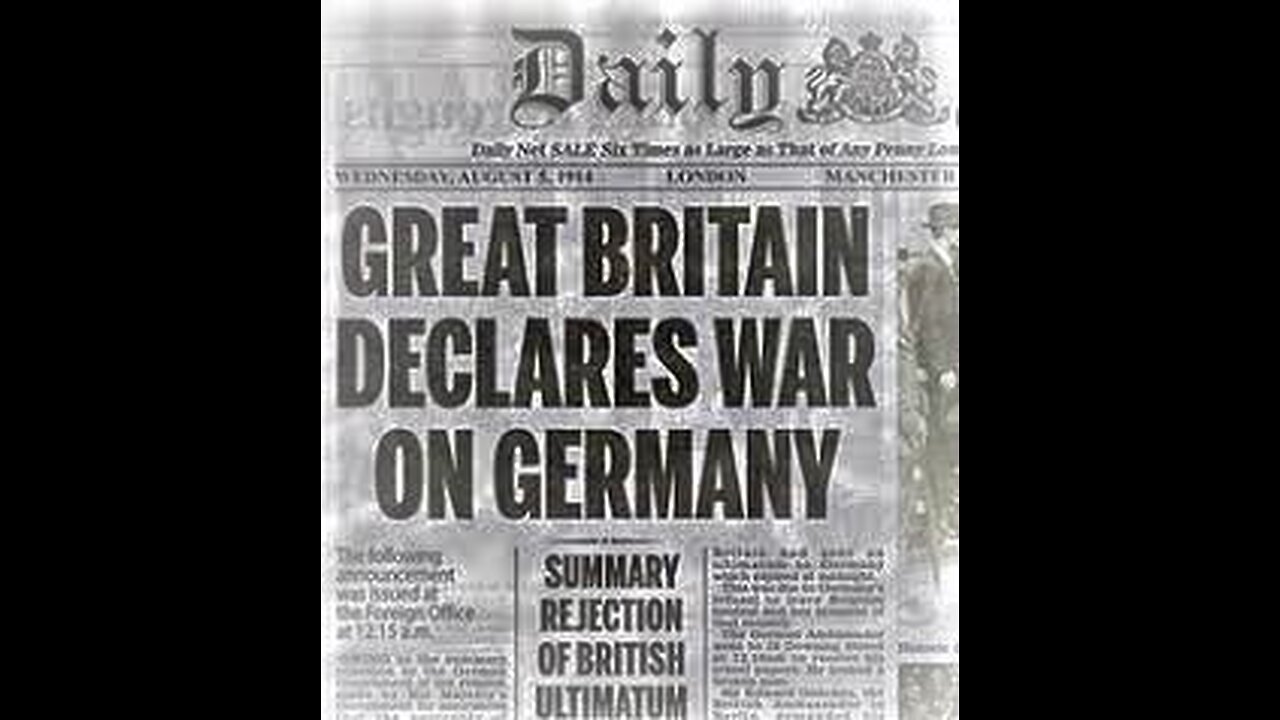Premium Only Content

It's Always Russia's Fault ( RUSOPHOBIA )
Why did America join the Allies instead of the Central Powers?
In the early 20th century, before the War, someone asked Kaiser Wilhelm what the most important issue in 20th century politics would be.
He replied “The Americans speak English.”
As a commenter below has pointed out, other sources attribute a similar quote to Otto von Bismarck “The North Americans speak English”, but that is disputed as well.
Even if neither said it, they clearly believed it.
But there were 3 specific triggers.
The first was the sinking of the Lusitania, a passenger liner that had several very rich, very important Americans on board, on May 7, 1915, by a German U-boat.
the Toronto Star Germany gave a warning. So why was Lusitania full? | Toronto Star, the German Embassy warned all passengers of all passenger ships that they could be sunk, in the same paper, on the same day, that the Cunard liner company ran an ad for Lusitania tickets.
It is also suspected, and I think common sense tells us it is true, that the Lusitania was not a pure passenger liner, and was carrying war materiel in its cargo holds.
Fast liner, tougher target for U-boats, makes sense. And post war disclosures confirmed it. Sinking of the RMS Lusitania - Wikipedia
The second was the sabotage of a munitions dump, scheduled for shipment overseas to the Allies, by German saboteurs. In July the US was neutral, but selling war materiel to the allies, so this sabotage in itself was an act of war. Black Tom explosion - Wikipedia
The final trigger, was the interception, by British intelligence tapping the undersea Atlantic cables, of a telegram from the German senior diplomat Arthur Zimmerman, on January 19, 1917.
The British immediately shared the Telegram with the US, in which Zimmerman proposes to the Mexican government that they should ally with Germany, and attack the US (who is still not at war with Germany). In exchange, the Germans promise Mexico the states of Texas, New Mexico, and Arizona.
We intend to begin on the first of February unrestricted submarine warfare.
We shall endeavor in spite of this to keep the United States of America neutral.
In the event of this not succeeding, we make Mexico a proposal of alliance on the following basis:
make war together, make peace together, generous financial support and an understanding on our part that Mexico is to reconquer the lost territory in Texas, New Mexico, and Arizona.
The settlement in detail is left to you. You will inform the President of the above most secretly as soon as the outbreak of war with the United States of America is certain and add the suggestion that he should, on his own initiative, invite Japan to immediate adherence and at the same time mediate between Japan and ourselves.
Please call the President's attention to the fact that the ruthless employment of our submarines now offers the prospect of compelling England in a few months to make peace.
Signed, ZIMMERMANN
It was a stupid idea, even if it hadn’t been intercepted, because Mexico was in no position, militarily or economically, to pull it off.
Once the US public learned of this, Woodrow Wilson, who had spent 3 years trying to broker a peace in WW1, had no choice. Zimmermann Telegram - Wikipedia
Because the differences between British and German naval power meant that war between them created a situation where American interests would favor Britain and disfavor Germany.
Britain’s biggest strength was as a surface naval power, able to blockade neutral trade from reaching Germany and seizing or destroying German commerce on the high seas.
Germany’s navy however, was bottled up in the North Sea and unable to impose a similar blockade against Britain.
So American interest in free trade as a neutral meant that it would continue to trade with Britain while Germany was shut out.
The only thing Germany could do in response was to use submarine warfare against Allied shipping, and this was considered provocative.
Conventional blockades worked by naval vessels ordering enemy shipping to heave to and be boarded, the ship then being taken as a prize into the nearest friendly port.
Submarines couldn’t do this; they could only fire on and sink ships, most often without warning (occasionally it was possible for submarines to give crew and passengers time to abandon ship).
Nowadays that’s simply accepted as part of naval war; but at the time it was regarded as a barbarity, the wanton murder of civilians on the high seas, practically an act of piracy.
So along with other factors- British propaganda successfully painting Germany as the militarist aggressor in the war, nativist sentiment against German immigrants, and concerns about expanding German influence in Latin America- the United States took a very dim view of Germany’s actions.
The clincher of course was the infamous Zimmerman telegram.
Would the Central Powers have won WWI if Britain joined them instead of the Allies?
In 1914 only two nations produced the chemical precursors to high explosives in significant quantities — Germany and the US. The entire Entente war effort would have collapsed without shipments from the US.
With Britain as one of the Central Powers France has no high explosives after they exhaust their initial stockpile thanks to the British blockade of France.
Possibly Russia as well, although historically the Central Powers beat the Russians anyhow.
Britain could have lived with a German victory in the first world war, and should have stayed out of the conflict in 1914
there had been no immediate threat to Britain, which could have faced a Germany-dominated Europe at a later date on its own terms, instead of rushing in unprepared, which led to catastrophic costs.
Britain could indeed have lived with a German victory
What's more, it would have been in Britain's interests to stay out in 1914
The Laurence A Tisch professor of history at Harvard University rejected the idea that Britain was forced to act in 1914 to secure its borders and the Channel ports.
This argument, which is very seductive, has one massive flaw in it, which is that Britain tolerated exactly that situation happening when Napoleon overran the European continent, and did not immediately send land forces to Europe.
It wasn't until the peninsular war that Britain actually deployed ground forces against Napoleon
So strategically, if Britain had not gone to war in 1914, it would still have had the option to intervene later, just as it had the option to intervene after the revolutionary wars had been under way for some time.
It was remarkable, he said, that Britain intervened on land so early in 1914, when quite unprepared.
Creating an army more or less from scratch and then sending it into combat against the Germans was a recipe for disastrous losses.
And if one asks whether this was the best way for Britain to deal with the challenge posed by imperial Germany, my answer is no.
"Even if Germany had defeated France and Russia, it would have had a pretty massive challenge on its hands trying to run the new German-dominated Europe and would have remained significantly weaker than the British empire in naval and financial terms.
Given the resources that Britain had available in 1914, a better strategy would have been to wait and deal with the German challenge later when Britain could respond on its own terms, taking advantage of its much greater naval and financial capability.
The comments are certain to fan the flames of the debate sparked by the education secretary, Michael Gove, about whether Britain's role in the war should be seen as heroic courage or monumental error.
academics feed those myths by attacking Britain's role in the conflict as a series of catastrophic mistakes perpetrated by an out-of-touch elite
We should not think of this as some great victory or dreadful crime, but more as the biggest error in modern history
The cost, let me emphasise, of the first world war to Britain was catastrophic, and it left the British empire at the end of it all in a much weakened state … It had accumulated a vast debt, the cost of which really limited Britain's military capability throughout the interwar period.
Then there was the manpower loss – not just all those aristocratic officers, but the many, many, many skilled workers who died or were permanently incapacitated in the war.
The death toll, which was greater than the second world war, was the most painful thing that Britain has ever experienced in war
the leaders, not just of Britain but of the European states took decisions that led to such an appalling slaughter.
Woodrow Wilson became president because he was the one person capable of becoming president who was willing to do business with the banking interests that wanted the Federal Reserve created.
The rise of Wilson is a strange story.
Had the GOP not been divided. a democrat would not have a a good shot at the presidency.
Champ Clark, then speaker of the house was favored going into the convention.
That Democratic convention was gridlocked and that gridlock was broken by a rumor that Clark had gotten in bed with Wall Street interests which got Byron’s backers to support Wilson.
The same interests that wanted Wilson president also wanted the US in WW I on the side of the British/French, part of the reason is that the interests that financed WW I were concerned if Britain and France did not win then the loans made might not be re payed.
Arguments about honor of course resonate today as they resonated in 1914, but you can pay too high a price for upholding the notion of honor, and I think in the end Britain did.
if Britain had stood back in 1914, it would have reneged on commitments to uphold Belgian neutrality
But realism in foreign policy has a long and distinguished tradition, not least in Britain – otherwise the French would never complain about 'perfidious Albion'.
For Britain it would ultimately have been far better to have thought in terms of the national interest rather than in terms of a dated treaty.
Ferguson, no stranger to controversy, is unlikely to worry about coming under fire for his views.
Last year he managed to stir up a massive row over a long-dead economist when he suggested that John Maynard Keynes had no stake in the future because he was gay and childless – although he did later apologize, calling his remarks "stupid and tactless".
From Elon Musk to Rupert Murdoch, a small number of billionaire owners have a powerful hold on so much of the information that reaches the public about what’s happening in the world.
Britain entered World War I on 4 August 1914 when the King declared war after the expiration of an ultimatum to the German Empire
The official explanation focused on protecting Belgium as a neutral country; the main reason, however, was to prevent a French defeat that would have left Germany in control of Western Europe.
The Liberal Party was in power with prime minister H. H. Asquith and foreign minister Edward Grey leading the way.
The Liberal cabinet made the decision, although the party had been strongly anti-war until the last minute.
The Conservative Party was pro-war.
The Liberals knew that if they split on the war issue, they would lose control of the government to the Conservatives.
Background
Main article: History of the United Kingdom during the First World War
Main article: Splendid isolation
The British Empire in 1914
For much of the 19th century, Britain pursued a foreign policy later known as splendid isolation, which sought to maintain the balance of power in Europe without formal alliances. As Europe divided into two power blocs during the 1890s, the 1895-1905 Conservative government realized this left Britain dangerously exposed.[1] This resulted in the 1902 Anglo-Japanese Alliance, followed by King Edward VII's 1903 visit to Paris. By reducing anti-British feeling in France, it led to the 1904 Entente Cordiale, the first tangible impact of which was British support for France against Germany in the 1905 Moroccan Crisis.
In 1907, the new Liberal government agreed to the Anglo-Russian Convention. Like the Entente, the Convention focused on resolving colonial disputes; but by doing so, it paved the way for wider co-operation and allowed Britain to refocus its naval resources in response to German naval expansion.[2]
HMS Dreadnought. The 1902, 1904 and 1907 agreements with Japan, France and Russia allowed Britain to refocus resources during the Anglo-German naval arms race
The 1911 Agadir Crisis encouraged secret military negotiations between France and Britain in the case of war with the German Empire. A British Expeditionary Force of 100,000 men would be landed in France within two weeks of war, while naval arrangements allocated responsibility for the Mediterranean Sea to the French Navy, with the Royal Navy looking after the North Sea and the English Channel, including Northern France.[3] Britain was effectively bound to support France in a war against Germany regardless, but this was not widely understood outside government and the military.[citation needed]
Antagonism with Germany
In explaining why Britain went to war with Germany, British historian Paul Kennedy (1980) argued that a critical factor was the British realisation that Germany was rapidly becoming economically more powerful than Britain. It was in essence not a consequence of the disputes over economic trade imperialism, the Baghdad Railway, the confrontations in Eastern Europe, highly-charged political rhetoric, or domestic pressure groups. Germany's reliance time and again on military aggression, while Britain increasingly appealed to moral sensibilities, also played a role, especially in portraying the invasion of neutral Belgium as (in the German view) a necessary military tactic or (in the British view) a profound moral crime. The German invasion of Belgium was not the real cause of war with Britain, because the British decision had already been made as the British were more concerned with the fate of France (pp. 457–62).[clarification needed] Kennedy argues that by far the main reason was London's fear that a repeat of the war of 1870, when Prussia and the German states smashed France, would mean that a rapidly industrialising Germany, with a powerful army and navy, would control the English Channel and northwest France. British policy-makers insisted that that would be a catastrophe for British security.[4]
Christopher Clark points out that the British cabinet decided on July 29, 1914, that being a signatory to the 1839 treaty guaranteeing Belgium's frontiers did not obligate it to oppose a German invasion of Belgium with military force.[5]
Decision for war
In the immediate aftermath of the assassination on June 28 of Austrian Archduke Franz Ferdinand (the heir to the Habsburg throne) in the Bosnian capital, Sarajevo, the British newspapers denounced the Serbian nationalist assassin, Gavrilo Princip, and were generally sympathetic to the Austro-Hungarian monarchy. The newspapers blamed the Kingdom of Serbia for the crime, with rhetoric against "fanatics", "dangerous forces" and "reckless agitators". These responses were broadly shared across the political spectrum, with Liberal and Conservative papers expressing their shock and dismay. But by July 27, press opinion had turned against Austria-Hungary. The national press divided along party lines, with Conservative papers stressing the obligation to support France, while Liberal papers insisted Britain had no such commitment and should remain neutral. [6][7]
As Germany and Russia became the central players in the crisis (respectively backing Austria-Hungary and Serbia), British leaders increasingly had a sense of commitment to defending France. First, if Germany again conquered France, as had happened in the Franco-Prussian War of 1870, it would become a major threat to British economic, political and cultural interests. Second, partisanship was involved. The Liberal Party was identified with internationalism and free trade, and with opposition to jingoism and warfare. By contrast, the Conservative Party was identified as the party of nationalism and patriotism; Britons expected it "to show capacity in running a war."[8] Liberal voters initially demanded peace, but were outraged when the Germans treated Belgian neutrality as a worthless "scrap of paper" (the words of German Chancellor Theobald von Bethmann Hollweg in ridiculing the Treaty of London). Germany, as part of a massive attack on France, invaded northern France through Belgium early on the morning of 4 August. The Belgians called upon Britain for military assistance under the 1839 treaty, and in response London gave Berlin an ultimatum which expired at 11 pm London time, which was ignored. King George V then declared war on Germany that evening.[9][10]
Before war was declared, the British newspapers gave the crisis extensive coverage but varied wildly in recommended policy options, basically covering the entire spectrum from peace to war.[11][12] C. P. Scott and the Manchester Guardian maintained an intense campaign against war. It denounced a "conspiracy to drag us into a war against England’s interests", arguing that it would amount to a "crime against Europe", and warning that it would "throw away the accumulated progress of half a century".[13] The politician David Lloyd George told Scott on Tuesday 4th August 1914, "Up until last Sunday only two members of the Cabinet had been in favour of our intervention in the war, but the violation of Belgian territory had completely altered the situation".[13] According to Isabel V. Hull:
Annika Mombauer correctly sums up the current historiography: "Few historians would still maintain that the 'rape of Belgium' was the real motive for Britain's declaration of war on Germany." Instead, the role of Belgian neutrality is variously interpreted as an excuse used to mobilise public opinion, to provide embarrassed radicals in the cabinet with the justification for abandoning the principal of pacifism and thus staying in office, or - in the more conspiratorial versions - as cover for naked imperial interests. [14]
Once war was declared, defence of Belgium rather than France was the public reason given for the war. Propaganda posters emphasised that Britain was required to safeguard Belgium's neutrality under the 1839 Treaty of London.[15][16]
"The Scrap of Paper - Enlist Today", 1914 British propaganda poster emphasizes German contempt for the 1839 treaty (the signature of British Foreign Secretary Lord Palmerston visible at the top), which guaranteed Belgian neutrality, as merely a "scrap of paper" that Germany would ignore.
As late as 1 August 1914, the great majority of Liberals—both voters and cabinet members—strongly opposed going to war.[17] The German invasion of Belgium was such an outrageous violation of international rights that the Liberal Party agreed for war on August 4th. Historian Zara Steiner says:
The public mood did change. Belgium proved to be a catalyst which unleashed the many emotions, rationalizations, and glorifications of war which had long been part of the British climate of opinion. Having a moral cause, all the latent anti-German feelings, fueled by years of naval rivalry and assumed enmity, rose to the surface. The 'scrap of paper' proved decisive both in maintaining the unity of the government and then in providing a focal point for public feeling.[18]
The Liberals succeeded in mending their deep divisions over military action. Unless the Liberal government acted decisively against the German invasion of France, its top leaders including Prime Minister H. H. Asquith, Foreign Minister Edward Grey, First Lord of the Admiralty Winston Churchill and others would resign, leading to a risk that the much more pro-war Conservative Party might form a government. Mistreatment of Belgium was not itself a fundamental cause of British entry into the war, but it was used extensively as a justification in wartime propaganda to motivate the British people.[19]
The German high command was aware that entering Belgium could trigger British intervention but decided the risk was acceptable; they expected it to be a short war, and their ambassador in London claimed civil war in Ireland would prevent Britain from assisting France.[20]
Historians looking at the July Crisis typically conclude that Grey:
was not a great Foreign Secretary but an honest, reticent, punctilious English gentleman... He exhibited a judicious understanding of European affairs, a firm control of his staff, and a suppleness and tact in diplomacy, but he had no boldness, no imagination, no ability to command men and events. [Regarding the war] He pursued a cautious, moderate policy, one that not only fitted his temperament, but also reflected the deep split in the Cabinet, in the Liberal party, and in public opinion.[21]
The majority of the Labour Party, which as a member of the Second International had opposed the war, also shifted to support after the German invasion of Belgium with the exception of some members such as its secretary Ramsay MacDonald. The rest of the Labour Party leadership under Arthur Henderson calculated that the war would be brief and that opposing it would cost the party at the next general election.[22]
Canada automatically joined the war, and vigorously recruited volunteers.
Irish crisis on hold
Main article: Home Rule Crisis
Until late July, British politics was totally focused on the threat of a possible civil war in Ireland. In 1912 the government had presented an Irish Home Rule bill that Irish nationalists demanded; under the terms of the Parliament Act 1911, by which the House of Lords retained the right to delay legislation by up to two years, it was due to become law in 1914. The Ulster Protestants demanded separate treatment; by mid-1914 the government was offering a six-year opt-out to the six counties which would eventually become Northern Ireland, but not the permanent exemption which they demanded. Both sides in Ireland had smuggled in weapons, set up militias with tens of thousands of volunteers, were drilling, and were ready to fight a civil war. The British Army itself was paralyzed: during the Curragh Incident officers threatened to resign or accept dismissal rather than obey orders to deploy into Ulster. Elements of the Conservative and Unionist Party supported them.
On 25 July the Austrian ultimatum to Serbia became known, and the cabinet realized that war with Germany was increasingly likely. The Government of Ireland Act 1914 was enacted into law, but was suspended for the duration of hostilities, with the issue of Ulster still unresolved.[23] Grey told the British Parliament on 3 August, "The one bright spot in the whole of this terrible situation is Ireland. [Prolonged cheers.] The general feeling throughout Ireland, and I would like this to be clearly understood abroad, does not make that a consideration that we feel we have to take into account. [Cheers.]"[24]
Empire at war
The king's declaration of war automatically involved all dominions, colonies, and protectorates of the British Empire, many of whom made significant contributions to the Allied war effort, both in the provision of troops and civilian labourers.
Why didn't the Allies attack through Portugal and Spain in the Western theater?
How might WWI have played out if Mexico had joined the Central Powers?
Why didn't the French declare war on Germany when they remilitarized the Rhineland?
What if America entered World War One siding with Germany?
What if the U.S. had have entered World War I in 1915 instead of in 1917?
Most answers focus on events during the war itself. Almost forgotten now is that the US had opposed German worldwide expansion for several decades of the New Imperialism
era preceding WWI and executed a Great Rapprochement
with Britain to stand together against Germany.
When do we join them?
Depending on when it occurred, and under what circumstances, it might have made a difference.
I can just imagine the Great White Fleet hitting Jellicoe in the rear at the peak of the Battle of Jutland. Game over.
Insofar as anything else militarily, I don’t think it would have mattered. We couldn’t have sent ground troops to Germany anywhere near as easily as we did to France, and at no time between 1914 and 1918 did we have the capability to land in Britain or France for an invasion after crossing the Atlantic in transports, not to mention that even if we could have, both nations were armed camps at the time.
However, Canada would have been screwed, if we attacked it without advance warning after a military build-up. That might have been the optimal scenario for a U.S. intervention on the side of the Central Powers, in fact. A U.S. military buildup, followed by entry into the war in late May 1916, with an American invasion of Canada and the U.S. fleet covertly sailing for the North Sea in order to coordinate movements with Scheer and the Hochseeflotte. However, keeping all of this secret from the British would have been exceedingly difficult, not to mention properly coordinating the attack.
In any case, if the Royal Navy were crushed at Jutland and the U.S. Army overran Canada, it would then be possible for American forces to support the Central Powers via embarkation at Kiel, and the victorious U.S. and Imperial German navies would be free to operate anywhere in the world against the British Empire, Japan, and Russia.
The Allies would sue for peace, and the German, Austro-Hungarian and Ottoman Empires would expand, while the Stars and Stripes would double their territory. World War II would still happen around 1940, but with very different alliances. Kemal would still overthrow the Sultan, and would probably take an enlarged Turkish Republic onto the Allied side in the rematch. Russia might be smart enough to sit that one out. Regardless of who did what, an even more powerful United States, now with the resources of Canada at its disposal as well, would be the deciding factor. (Especially with the services of Professor Einstein of the Kaiser Wilhelm II the Great Academy of Sciences at the Central Powers’ disposal.)
But all of this happens only if they could properly coordinate the U.S. entry into the war at the right time. If they couldn’t, the Allies would still win the war, at least in Europe. The United States was only able to tip the scale to the Allies because the British controlled the seas. To tip the scales to the less accessible Central Powers, they would definitely have to do the same.
Why were the Allied powers so harsh on the Central powers after the end of WWI?
I don't think the Allies were that harsh on Germany after WW1. The Germans moaned and got all melodramatic about the Treaty of Versailles
, but it was relatively mild far as those things went, and far less draconian than what the Germans would have imposed had they won. We don't even need a hypothetical for that - we know because when Russia sued for peace in 1917, the Germans imposed a draconian treaty, the Treaty of Brest-Litovsk
, that was orders of magnitude harsher than what they got when the shoe was on the other foot in the Treaty of Versailles.
And the last time the Germans won a war before that, at the conclusion of the Franco-Prussian War they imposed upon the defeated French the Treaty of Frankfurt (1871)
, which was also harsher than the Treaty of Versailles.
The problem is that the Allies failed to enforce the terms of Versailles when Germany started violating them. Hitler basically punked them, especially with the reoccupation of the Rhineland, when the deck was stacked in the Allies' favor to smack him down at little cost to themselves, and the near certainty of bringing the Nazi regime to an early end in 1936.
How would a one-on-one war between Italy and France in 1940 have played out (no foreign interference)?
On June 10, 1940 Mussolini declared war on France and Britain. Hoping to grab territory in France before the French surrendered to Germany, Mussolini sent large numbers of Italian troops into southern France to seize Nice and a few other border towns. The Italians were mauled by the French alpine troops they encountered. The Italians were unable to advance more than a few kilometers into France and did not meet any of their objectives. Italy was woefully unprepared for war 1940. Mussolini rushed them into to the conflict so Hitler would not seize all of Europe under Italy’s nose. It is clear that the French, although having no appetite for war in 1940, could still have defeated Italy on a 1 on 1 war.
A Central Power victory. Without Great Britain, many of the Central Power’s problems either are alleviated or vanish completely.
For one, the Western Front would be a much easier nut to crack. The French put up brave, bloody and successful resistance for most of the war, but by mid 1916 were becoming increasingly spent. By 1917 an increasing amount of the front was being taken care of by the British, as well as major battles. But with the UK now on the other side of the trenchline, the French would be bled dry by 1916. Worse, the British would be actively fighting against them. Forget all the British divisions now shooting at the French. The British might now team up with the Germans to cut off France from her colonies. Germany would face no starvation, nor much condemnation for her attack into Belgium.
For Russia its equally bad. With fewer Germans needed in the West they would swarm East to crush the Russians in the snowy plains. The Ottomans would only have one front in the Caucasus vs four with the British in Egypt, Libya and Arabia. Italy might not join, as the British might offer her a chunk of French colonies and land, leaving Austria to hurl her might elsewhere.
And of course not forgetting the poor Serbians, now facing more Germans and Austrians and without Entente aid as British ships cut her off.
The Central Powers wouldn’t just gain the UK either. Neutrals like China and Brazil wouldn’t enter, as they joined to curry favor with the Entente. Nor would America enter, since she now won’t lose any ships from German U-Boats.
Who would win in a war between the Northern Union army of the American civil war and the Prussian army of the Franco Prussian war?
I'm not sure if the Union and Confederate army together could have taken on the Prussians. But then again the Prussians could never have built an army like they fielded in 1871 with the infastructure of North American during that period.
The Germans were very well organized and that allowed them to use Germany's heavily developed urban centers and rail network to crank out a large, well armed army with a basic level if training lead by a good cadre of officers.
Man for man I would expect the Prussians and Americans to be roughly equivalent soldier lead by equivalent officers.
In the field of weaponry the Prussians had a dominating lead. They were armed with a decent needle rifle that had better effective range and triple the rate of fire that an American could achieve with a rifled musket. The Prussians also had the epic Krupp 6 pounder field gun. It was was lighter, more accurate, had a higher velocity and had quadruple the rate of fire as a Union or Confederate 6 pounder. Almost as important it fired the Krupp 6 pound contact detonating high explosives shell. And they had alot if them.
No one expected the Germans to be able to mobilize with the incredible speed they did. I would imagine it shocked the world in a similar way the Americans shocked the world with their incredible Gulf War blitz.
When did the USSR and the USA join the Allied powers?
They never did.
The Allied Powers were those who recognized the Authority of the Anglo-French Supreme War Council.
The Soviet Union became a co-belligerent on 22 June 941 and the US on 9 December 1941.
Both joined most of the Allies in creating the United Nations on 1 January 1942 both neither officially joined the Allies.
Although the term “Allies” is used in most works, it is technically incorrect and should be “United Nations”.
What if the US had sided with Germany in WWI?
Originally Answered: What if the US sided with Germany in WWI?
For this to have happened I see two necessary preconditions. First, Wilson does not become President. The simplest way that could happen is to have McKinley survive his historical assassination; Teddy Roosevelt is then a non-factor, and he does not split the Republican vote in 1912. Instead we get a President who is concerned about American interests instead of an anglophile who wants to reshape the world in his own image. Second, the British have developed an extensive chemical industry, and are able to produce their own high explosives in quantity. (Historically only the US and Germany produced these in large quantities in 1914.)
In our alternate history France and Britain do not buy nearly as much ammunition from the US as they did historically. As a result, there is no pressure from big business to meekly ignore the British war crime of blockading food shipments to Germany. We will assume that US warships escort merchant ships past the blockade, except the British fire on them. US and Germany are now cobelligerents.
At this point nothing matters. Historically the French and Russians ran out of money by 1916, and Britain was financing the entire Entente war effort. By fall 1917 they would have exhausted their funds and credit, and would have had no choice but to negotiate a settlement on Central Powers terms. But historically Wilson conned Congress into a declaration of war in the spring, and the US ended up paying the Entente Bill's. In our alternate history that does not happen and the Entente ends up signing a “reverse Versailles” treaty, regardless of anything the US does.
Without Wilson trying to reorder the world there are a few territorial adjustments but there is no wholesale restructuring of Europe. The Germans intervene in the Russian Civil War on the side of the Whites; “Lenin" and company are executed and the world becomes a better place. Britain and France are shaken but not to the point of becoming analogs of Weimar Germany. The 20th century continues as it had, like a higher-tech version of the 19th century.
If you disagree with the above, do not tell me in a comment, just write your own answer.
Why did the Central Powers lose WW1? Were they similar reasons why they also lost WW2? Could they have realistically won both WW1 & WW2 if they just fought harder, or were they just not strong enough in both major conflicts versus their adversaries?
When we say central Powers, we might as well just say Germany. Germany was carrying every member of the Powers, with the contributions by those powers being out of proportion to the aid they received.
That alone might be the biggest cause of their loss. Austria was in no shape for a modern war, certainly not against Russia. Turkey was not ready for war, certainly not against Britain who was stationed right in Egypt.
Where as France, Britain, and Russia could have reasonably expected to overwhelm Germany, which they didn't. Germany ought to have known better than to go to war against those allies with so few allies. Bismarck would never have approved.
Then there's the strategic blundering. Germany like in world War II was a master of tactics but poor on strategy. In the Great War, they became so dedicated to the strategy of using U-boats to blockade England that they went to war with the US to allow themselves unrestricted u-boat warfare. Then, having realized how stupid they had been too late, they threw everything away on a last ditch offensive that couldn't work unless everyone in the Allies had been taking stupid pills. And by then, the Allies were all out of stupid pills.
Finally, the inability of Germany to feed itself well is what finally did her in and cause the revolts that ended the Kaiser's reign and ended the war prematurely. Though, as no one on any side had envisioned such a lengthy war, it's hard to chide Germany specifically for not being food independent at the same time they were miraculously becoming independent of so many other industrial necessities.
Who is the United States most loyal military ally?
A lot of people don’t know this fact, but our best ally in the world is not the UK, not France, not even Canada…. It’s Australia…
We basically have the same history. We were born out of the bosom of the British Empire. When England, Ireland, or Scotland became overpopulated, the British Nobles sent their excess populations to our lands, so we’re basically the descendants of the same people. And we basically conquered our current countries the same way, but we really don’t like to talk about that.
The only difference between our two populations is that the United States is essentially 80% (more like 77.8% based on a 2010 census) West European (15% German/ 15% Hispanic (Spanish), 15% Irish/ 15% English/ 5% Scottish/ 5% Italian/ 5% Scandinavian/ 5% Polish) whereas European Australians primarily are from the British Isles in general.
The two of us secretly love each other not only because we generally have a similar history, but we also have a history of, shall I say, fraternization? Our two cultures fit in very well among each other so we find it easy to find “extracurricular” partners when we visit one another’s countries. And American (Midwestern/Texan Americans) and Australian men tend to be a little rugged, one growing up wrestling (American Midwesterners) their whole life, the other playing rugby (Australians). So Australian and American men find more in common with one another, since the European men have become, shall I say, rather hipster-ish and “softer” in their post WW2 “we’re nice people now” phase. The Americans and Australians didn’t get bombed to smitherines in WW2, so we didn’t have that “we need to become more gentle” realization as much as the Europeans did.
But in the end, while culturally we’re very similar, it mostly comes down to the fact that we need one another. Australia needs the American Navy to defend it against East Asian threats. And we were there for them when the Japanese went a little cuckoo. And they’ve been there for us in our geopolitical strategy of containing the Asian periphery. While the “gentle” Europeans were scared to send soldiers to Vietnam, the Australians were on the front lines with us, pounding shots and beer while getting shot up just like us. When we went a little crazy and decided to invade Iraq for whatever reason, the Australians said “fuck it” and pounded down a shot, grabbed their rifle, and sent more men than any European country (excluding the UK). They’ve been with us against Japan, Korea, Vietnam, both Iraq’s and technically in both World Wars (although they were mostly fighting for the British in WW1). And if China gets a little cocky and attempts to spread its influence where it shouldnt be, you can bet the two powers will be fighting along one another yet again. And if America decided to invade another country for another stupid reason, you can bet the Australians will be running along with us.
Although Canada, Britain and France get honorable mentions, the Canadians and Brits burned down our damn White House for Gods sake! (I say that tongue in cheek), and the French got a little smug (rightfully so) when we got a little weird and invaded Iraq. But Australia, they don’t ask questions. They just show up, beer in hand, rifle in the other, saying “let’s do this motherfuckers. Were probably making a mistake America… but it’ll be ‘our’ mistake.”
And for that reason, Australia is America’s best ally.
What would happen if Japan, Italy and Mexico joined the Central Powers during World War 1?
If Japan became an ally of the Central Powers, then the First World War in the Pacific would become much less of a one-sided romp by the Allies. It is not clear to me that Japan circa the 1910s would be able to resist the might of the British Empire, aided by France and Russia, but it would certainly complicate matters. All three Entente powers, as well as the dominions like Canada and Australia, would need to devote substantial forces to the Pacific front. The impact on China might be interesting: Could China secure, at least, Western support versus Japanese aims at an early date?
If Italy became an ally of the Central Powers, the establishment of this power alongside Berlin and Vienna might change the war. Never mind the impact of the Mediterranean being a contested field, it is at least imaginable that an Italian offensive against France might drastically worsen the French position. If Italian armies take Provence while France is fighting a dear battle in the north, can the French Republic survive?
If Mexico became an ally of the Central Powers, I do not see it as affecting things. Besides being locked in a civil war, Mexico is remote from the territories of any of the powers. The easternmost reaches of Mexico in the Yucatán do border upon British Honduras and so some war would be waged, but I do not think this war to be something that either side would devote much attention to.
If all three powers joined the Central Powers nearly simultaneously, this might well be enough to affect the outcome of the First World War. An even partially successful Italian offensive against France could knock France out of the war, while a hostile Japan would—most favourably for the Allies—deeply complicate their position on the far side of the world from Europe. Even Mexico, distracted by its internal quarrels, might help out imperial overstretch.
The sinking of Louisitania. The German U-boat had sunk the Louisitania during her trip to the United States, justifying it as a British spy ship. This angered American public.
The bombing of Black Tom Blacksmith, a military blacksmith in New Jersey. This act, suspected to be from a German agent, further angering Americans that Germany wanted to challenge their dominance and power.
Britain. Yes, isn’t Britain and America speaking same language? English? Yes. No matter what, Americans still don’t want to disappoint their forefathers who built up and laid the ground to modern day United States of America.
Zimmermann Telegram sent to Mexico in attempt to encourage Mexico wage war against the U.S. and retook lost land of 1846–8 war, discovered by British emissary in America and became crucial point.
There were some religious elements, too. The Ottoman Empire, a Central Powers party, had been engaging in ethnic cleansing of Armenians, Greeks and Assyrians, as well as later staged riots against Jews in Jerusalem at 1916. The United States, a predominant Christian state, had been very hostile to Turkish Government for their records of butchering Christians in Turkey.
How would the world be if Japan didn't colonize any more land after WWI and stayed allied to the U.S. and the rest of the world?
Originally Answered: How the world would be if Japan didn't colonialized anymore land after WW1 and stayed allied to U.S. and the rest of the world?
This would save millions of Chinese and other Asians and hundreds of thousands of Europeans much pain and suffering.
Asian colonial empires would likely still exist albeit reduced, as without Japan European power is never seriously challenged and the drive and ability to rebel is not created in Asia.
The KMT would have won the Civil War, as without the Soviets handing over Manchuria the CPC would have no stable base to wage war, if they haven’t already been crushed from 1931 onwards by a non-distracted KMT.
Korea would likely still be suffocated under the Japanese boot.
So no Korean war, if there is its an invasion, not support of a local government.
The Japanese retain control of the Kuril islands.
Atomic bomb likely tested on Germany or on a remote island if the war ends before its ready.
Japan is celebrated as having achieved an impossible feat of being allied to everyone, as even the Swiss have only managed the measly task of being neutral and friendly to everyone.
Either that or she’s condemned as the traitorous country trying to ally with everyone and breaking literally every pact.
I've wondered this myself. America had millions of German immigrants too, could have gone either way. I believe the US was already biased towards the UK and France at the start, but the US tried to stay neutral, and was successful for 3 years. WW1 started in 1914. The US didn't get involved until 1917.
I'd say America was slowly swayed over time by events, and possibly some British exaggerating / propaganda. Germany was seen as the aggressor due to its brutal conquest of Belgium. If a German soldier was killed in occupied country, they thought nothing of rounding up a dozen civilians to shoot as a lesson. Imagine the US doing this in Iraq? Turns the world against you real quick to deliberately murder innocent civilians. But this was a different time…
Then no doubt it was the U-boats that made America join Britain. Britain's Navy was superior to Germany’s. Germany knew this, only one naval surface battle (Jutland) occurred during the war between Britain and Germany. German surface ships didn't leave port for the rest of the war. So Germany turned to U-boats. U-boats could sneak past the British blockades, and inflict damage beyond their weight. They sank British shipping, and severely hampered Britain. Note that at a time without Trans-Atlantic aircraft and radios, if German ships weren't visiting American ports to share their side of the story, then guess who's news got reported? Britains.
By international treaty, civilian ships could not be sunk. At first Germany complied, and was even noble about it. Stop a ship, search it, sink it with guns only if weapons were found, after allowing the people to get off in lifeboats. This must have taken much time, and made the U-boat take great risk of being discovered and destroyed by that superior British navy.
Over time, as in all wars, the noble rules fell apart. Who started it? Who can say. The Germans started torpedoing merchant ships of British flag, likely to reduce their risk. When it became effective, no doubt Britain decided to ship weapons on US flagged ships. This came to a crisis when a U-boat sank the USS Lusitania, killing maybe a thousand US civilians.
Did the Germans merely make a mistake identifying the ships flag, or did they know the US / Britain were smuggling weapons aboard? Didn’t matter, shit hit the fan, and the US declared war on Germany.
Honestly, I do not put it past the British to have snuck weapons onto many US civilian ships, and maybe even let the Germans know this was happening, with the deliberate aim of provoking Germany to sink US ships. No doubt Germany had spies in Britain and US ports. No doubt US and British powers may have colluded to get the US into the war. Certainly war weary Britain wanted the US to join on their side. Britain was sneaky, clever, masterful in espionage. The US was naive, easily swayed, maybe even looking for an excuse to join the war. English Americans became vocal about supporting Britain. German Americans became quiet, even ashamed, some even changed their names to something less German.
It was a slow process of developing a bias towards Britain, and overcoming America's isolationism. Britain may have been positively flabbergasted how hard they had to scheme to drag America into the war. But when you're throwing thousands of your best and brightest into a meat-grinder daily for years, you get desperate.
Communication, money and one man’s bigotry.
Communication was critical. As soon as the war started, the English cut the telegraph cables from Germany, so all the Americans got in the way of new was British propaganda.
Money - The Americans had sold tons and tons of war material to the Allies, paid by loans and bonds. Meanwhile the British blockade prevented the Central Powers from benefiting from this largess. However, if the allies lost, the chances of recouping these bonds and loans dropped dramatically, and that would be bad for business. (this behavior would lead to the post war American neutrality acts, and feed American pacifism in the 1930’s)
These first two factors inclined the American people toward the possibility of entry into the war. The last factor, below, cast the die.
Woodrow Wilson - now there was a bigoted piece of work. Theodore Roosevelt accurately described him as that “Damned Presbyterian hypocrite.” (with apologies to Presbyterians - Teddy said that, not I)
Not only did he entirely wipe out the modest civil rights gains made by black people over a half century, he plunged America into the bloodiest war in history, to that date, at the first available opportunity, for the flimsiest of reasons. He did this to protect the English, the most vile and abusive colonial power of its time. So much for making the world safe for democracy.
He was the last living American Tory. I truly believe he wished, in his heart of hearts, that America had lost the Revolutionary War. He was fulsome, if not sycophantic, in his praise of the British Parliamentary system and dismissive of his own governmental system. (In short, the man was a lime sucking twit, who could have done the entire world a big, fat hairy favor by becoming an English subject)
That is, in essence, why he dragged America into the war. As mentioned above, he had permitted the flagrant violation of the accepted rules of neutrality, by allowing American manufacturers to provide the British and French with arms and munitions. The British had a blockade on Germany and Germany retaliated (foolishly, but legally) with a submarine blockade of the British Isles, to choke off the material support from America.
Based upon the German action, America may or may not have had a right to conduct a naval war against Germany, to guarantee freedom of navigation for its vessels. That would have been in concert with the theory and practice of St. Thomas Aquinas’s Just War, which governed the actions of civilized nations for a millennia. In a just war, there is the principle of proportionality, which is the determination of how much force is morally appropriate. Proportionality requires that a combatant nation use only the amount of force absolutely necessary.
But, I would contend that the injury America perceived from the German blockade did not admit the conduct of a ground war against Germany and certainly did not license the declaration of war against Austria Hungary, which had offered no offense at all, to America.
But Wilson threw 150 years of studied American statesmanship out the window, (because he knew better than the founding fathers), and abandoned George Washington’s principle of avoiding foreign entanglements. Wilson gleefully joined the Allies, gave the allies their victory with American blood, and then submissively allowed the Allies to impose their punitive peace upon Europe. Tellingly, the Versailles atrocity was inflicted on the world on the 28th day of June, 1919, the fifth anniversary of Franz Ferdinand’s murder. This was the demonstration of the allies’ monumental contempt for the principals of international law, not to mention Wilson’s fourteen points. Wilson gleefully and hypocritically (see, Teddy was right) abandoned his principals ) to make his British allies happy and fulfill all the dirty secret deals the English had made with the Italians, Romanians, Serbs and the French. That is to say, if Woodrow Wilson ever had any principles, to begin with.
That is why America joined the allies in WWI, and that decision only cost America 530,000 dead in two world wars.
-
 13:21
13:21
Dr. Nick Zyrowski
5 days ago10 Dangerous Foods RFK Jr Just BANNED
7.47K14 -
 5:05
5:05
Legal Money Moves
9 days agoAI Is Making Rich People Richer (And Everyone Else Poorer)
2.97K3 -
 19:23
19:23
Nikko Ortiz
1 day agoRealistic Halloween Horror Movie Deaths
6.85K6 -
 1:01:27
1:01:27
VapinGamers
17 hours ago $0.03 earnedTools of the Trade - EP09 The One About Comedy with Lou Perez - !rumbot !music
18.2K3 -
 2:10:06
2:10:06
The Michelle Moore Show
1 day ago'Capitol Tunnels, DC Doctored Crimes Scandal, Jesus In History Books, Pinktober Darkside & more' Guest, Lt. Mark Taylor: The Michelle Moore Show (Oct 27, 2025)
24.4K91 -
 LIVE
LIVE
Lofi Girl
2 years agoSynthwave Radio 🌌 - beats to chill/game to
173 watching -
 3:05:31
3:05:31
Price of Reason
12 hours agoTrump DHS Shakeup? Sydney Sweeney Christy Movie EARLY Review! Disney JUMP Ship After Doctor Who FAIL
184K9 -
 2:44:01
2:44:01
Badlands Media
11 hours agoDEFCON ZERQ Ep. 015: The Hidden Hand, UFOs, and the Global Awakening
136K72 -
 2:03:09
2:03:09
Inverted World Live
11 hours agoLoeb Talks Probe with Joe | Ep. 131
78.9K12 -
 3:06:01
3:06:01
TimcastIRL
9 hours agoGOP Declares Biden Pardons VOID Over Autopen, DOJ Announces Investigation | Timcast IRL
250K201